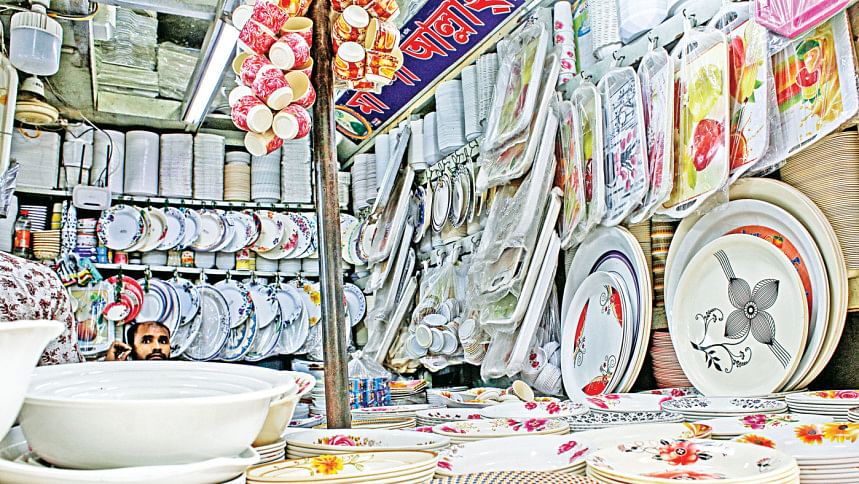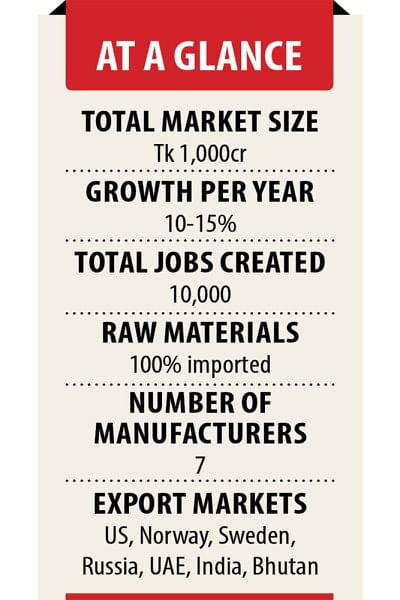Melamine market growing steadily

Households in Bangladesh have historically tended to use earthenware, china, stainless steel and even pewter for dinnerware. But once its use came to be known, melamine products quickly gained popularity, especially in rural and semi-urban areas.
The market of melamine products, mostly tableware, has been growing steadily in Bangladesh for the past two decades thanks to their durability and cheaper prices compared to alternative products, according to industry insiders.
Melamine is a colourless crystalline organic compound principally used in the manufacture of synthetic resins. Modern commercial production of melamine typically employs urea as a starting material, states britannica.com.
Usually formulated with fillers and pigments, melamine resins can be molded into dishes, containers, utensils, handles, and the like or used as laminating agents or coating materials for wood, paper, and textiles, it reads.

Melamine dinnerware is apt for a more casual dining. Available in various colours, shapes and styles, melamine has the same appeal as china. Its lightweight, sturdy and almost indestructible property makes it ideal for outdoor settings.
In Bangladesh, there are at least seven large-scale product manufacturers making use of melamine. They include Pran-RFL Group, Sharif Melamine, Diamond Melamine Industries (Pvt) Ltd, Bengal Melamine and Bangladesh Melamine Industries Ltd.
There are also smaller operations catering to their own market segment.
Products vary, from plate, bowl, tray, glass, cup and spoon to even ashtrays.
A plate can cost anywhere from Tk 100 to Tk 150. In contrast, one made of ceramic can go up to Tk 300 to Tk 350.
Reliable annual sales figures are hard to come by. However, the market players estimate it to be around Tk 1,000 crore now whereas it was Tk 800 crore in 2018.
"Quality of the products and additions of new designs helped in expanding the domestic market," said Md Atiqur Rahman, manager at Sharif Melamine.
Other influencers include their durability, colour stability with smooth surface finish and being odourless, he said.
"Customer like melamine products due to affordable price and attractive design," he noted.
He believes the demand would continue to grow in line with economic growth in rural Bangladesh.
Sharif Melamine has simultaneously explored its export market so far in 14 countries, namely the US, Norway, Sweden, Russia, Finland, Kazakhstan, Saudi Arabia, Qatar, Oman, United Arab Emirates, India, Bhutan and Australia.
It looks and feels like ceramic, is a food safe plastic free from Bisphenol A, perfect for indoor and outdoor use, easy to clean and is dishwasher safe, said Fahim Hossain, deputy general manager for Pran-RFL Group's Italiano brand.
Apart from local demand annually increasing by 10 per cent to 15 per cent during the past decade, there is huge potential in the global market, he said.
Italiano products are regularly being exported to 18 countries, including the US, Australia, New Zealand, Canada, Saudi Arabia, United Arab Emirates, India and Spain, he added.
Hossain believes the sector employs around 10,000 people. However, there was no reliable data about the total investment, he said.
Mrimoy Kanti Das, assistant general manager of Bengal Melamine, said the Bengal Group of Industries entered the melamine sector just four years back taking note of the market's rapid growth.
He said the market was growing rapidly as people, particularly in rural and semi-urban areas, like melamine products for their beautiful designs and durability.
Besides, the price of melamine products is reasonable compared to those of ceramic, he added.

 For all latest news, follow The Daily Star's Google News channel.
For all latest news, follow The Daily Star's Google News channel. 



Comments